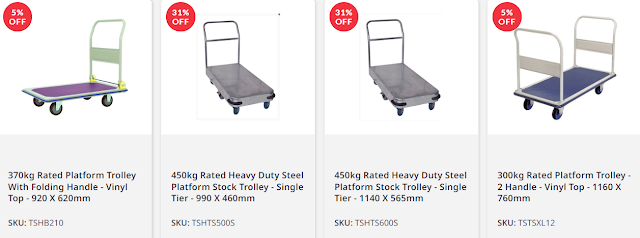A Comprehensive Guide to Selecting the Perfect Platform Trolley for Your Business
In the dynamic landscape of modern business, efficiency and productivity are key factors that can make or break an operation. Whether you're managing a warehouse, a retail store, a healthcare facility, or any other business, having the right tools and equipment is essential for smooth operations. Among these tools, trolleys in Sydney stand out as versatile workhorses that can significantly streamline tasks and enhance overall efficiency. Platform trolleys come in a wide variety of designs, so it can be difficult to choose the right one for your business needs. This guide aims to simplify the process and help you make an informed decision.
1. Understand Your Requirements:
The initial and fundamental step in the process of selecting the appropriate platform trolley for your business is to thoroughly assess and understand your specific operational requirements and demands. Consider the tasks and operations where the trolley will be used. Are you transporting heavy goods, moving delicate equipment, or navigating through tight spaces? Determine the typical load weight, dimensions, and any specific challenges you need to address. This understanding will serve as the foundation for selecting a trolley that perfectly fits your requirements.
2. Load Capacity:
One of the most critical factors to consider is the trolley's load capacity. Exceeding the load limit can lead to safety hazards, premature wear, and potential damage to the trolley. Choose a platform trolley with a load capacity that comfortably accommodates your heaviest expected loads while leaving a margin for occasional spikes.
3. Wheel Type and Material:
Wheels play a significant role in the maneuverability and stability of the trolley. Depending on your environment, choose between pneumatic, solid rubber, or polyurethane wheels. Pneumatic wheels provide shock absorption and are suitable for uneven surfaces, while solid rubber or polyurethane wheels offer durability and smooth movement on flat floors. Swivel wheels enhance maneuverability, making it easier to navigate corners and tight spaces.
4. Ergonomic Design:
Consider the ergonomics of the trolley, especially if it will be used extensively. Ergonomically designed handles, comfortable grips, and user-friendly controls contribute to operator comfort and reduce fatigue during prolonged use. A well-designed platform trolley can boost productivity and contribute to a safer working environment.
5. Material and Build Quality:
The material and build quality of the platform trolley determine its durability and longevity. Frequently encountered materials comprise steel, aluminum, and plastic. Steel trolleys offer robustness and heavy-duty capabilities, aluminum trolleys are lightweight and corrosion-resistant, while plastic trolleys are lightweight and suitable for non-industrial settings. Choose a material that aligns with your operational requirements and the trolley's intended usage environment.
6. Folding and Storage Options:
If storage space is a concern, consider foldable or collapsible platform trolleys. These trolleys can be easily folded for compact storage when not in use, saving valuable space in crowded areas. Folding trolleys are particularly useful for businesses with limited storage availability.
7. Braking Mechanisms:
Brakes add an extra layer of safety, especially when the trolley is loaded on an incline. Some trolleys come equipped with wheel brakes that prevent unintended movement, providing stability during loading and unloading.
8. Customization Possibilities:
Depending on your unique needs, you might require specific features or modifications. Some manufacturers offer customization options, allowing you to tailor the trolley to your precise requirements. Discuss your customization needs with the manufacturer to ensure you get a trolley that perfectly suits your business operations.
9. Reviews and Recommendations:
Before making a final decision, research customer reviews and recommendations. Learn from the experiences of other businesses that have used the same or similar trolleys. Their insights can provide valuable information about the trolley's performance, durability, and any potential drawbacks.
10. Budget Considerations:
While it's important to find a platform trolley that meets your needs, it's equally crucial to stay within your budget. Compare prices from different manufacturers and suppliers to find a balance between quality and affordability. Remember that a well-constructed trolley is an investment that can yield long-term benefits.
In conclusion, choosing the right platform trolley for your business
needs involves a combination of understanding your requirements, considering
factors like load capacity, wheel type, ergonomic design, and build quality,
and staying within your budget. By carefully evaluating these factors and
researching your options, you can select a platform trolley that enhances
efficiency, productivity, and safety in your business operations. Whether
you're in warehousing, retail, healthcare, or any other industry, a well-chosen
platform trolley can become an invaluable asset that contributes to your
business's success.



Comments
Post a Comment